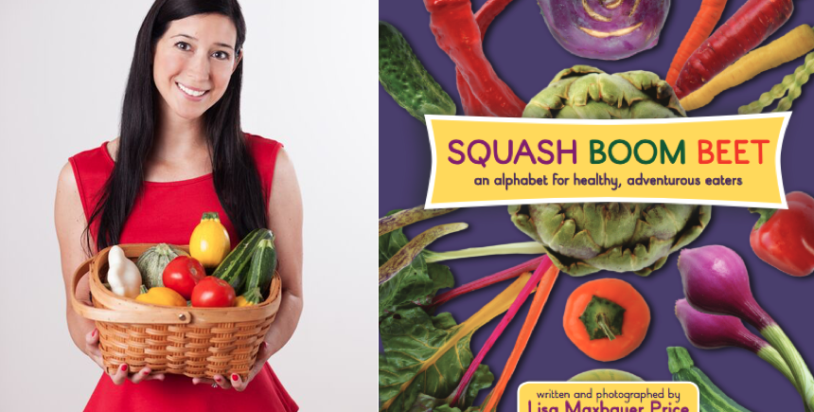
Squash Boom Beet
“Squash Boom Beet” Helps Kids Become Adventurous Eaters
We’re checking in with Traverse City author Lisa Maxbauer Price about
her children’s book “Squash Boom Beet: an Alphabet for Healthy,
Adventurous Eaters.” Lisa is a national nutrition journalist and has
blogged about parenting for The New York Times.
Lisa believes if kids can see the wild colors, study the different textures
and learn the crazy names (have you ever heard of candy cane beets
and fairy tale eggplants?!) of vegetables growing near their home, they
will naturally become fans.
In addition to helping families eat healthier, the hardcover field guide
features produce grown at more than 50 local farms in the Grand
Traverse region such as Loma Farm and Birch Point Farm in Leelanau
County and Between the Bays and Wunsch Farm on Old Mission
Peninsula. The book also features healthy food grown at four area
schools.
Find a copy of the book at these locations and try these fun activities
with your kids.
Your approach to vegetables is pretty unique. It’s not,
‘eat your
vegetables—they’re good for you,
’ it’s about creating exciting and
empowering experiences so children want to eat their vegetables.
How have kids reacted to the book so far?
Everyone—kids and adults—have the same reaction when they first
open the book. They say, ‘It’s so colorful!’ It really is a feast for the eyes.
I think some people have gotten so used to artificial colors in foods like
cereal that they are pleasantly surprised to be reminded exactly how
wildly colorful vegetables can be.
I haven’t even heard of some of these vegetables—dragon tongue
beans for example. What are some other fun foods children and
parents will learn about?
I really tried to zero in on foods that would pique people’s interest. For
example, I featured red fire lettuce, dinosaur kale, candy cane beets,
fairy tale eggplants, red zeppelin onions, peaches and cream corn,
rainbow chard, lemon cucumber … the list goes on. The fun names
alone are great conversation starters with kids. I encourage kids to talk
to their local farmers at the farmers’ markets. There is some really
amazing and creative stuff being grown right in our backyard. Kids are
also excited to learn in the book that they can eat certain edible flowers
like nasturtium or try something mysterious like romanesco that looks
other-worldly—like coral growing in the ocean.
Why did you decide to photograph food at local farms in Northern
Michigan rather than illustrate the book?
Many experts believe that kids can benefit from having some books
containing real photography in their home libraries. Photography helps
with recognition and vocabulary building. I wanted to empower kids to
know which foods they were seeing at the market, and drawings just
wouldn’t do them justice. Nothing beats the real thing. My three children
love the Carl R. Sams books like “Stranger in the Woods” that
showcase real photography of forest animals. Plus, research suggests
that kids are more likely to eat food if they play a role in buying and
preparing it. So this fun book can be a helpful tool.
Is there anything you’d like to add about your book?
I’m grateful for the local farmers who work so hard to make this region
beautiful, prosperous and healthy. Traverse City is such a great foodie
town but there wasn’t enough for the youngest eaters in the area. I hope
this book helps to get more people talking about local eating and
celebrating the work of Michigan farmers.
By: Carly Simpson, MyNorth Media
